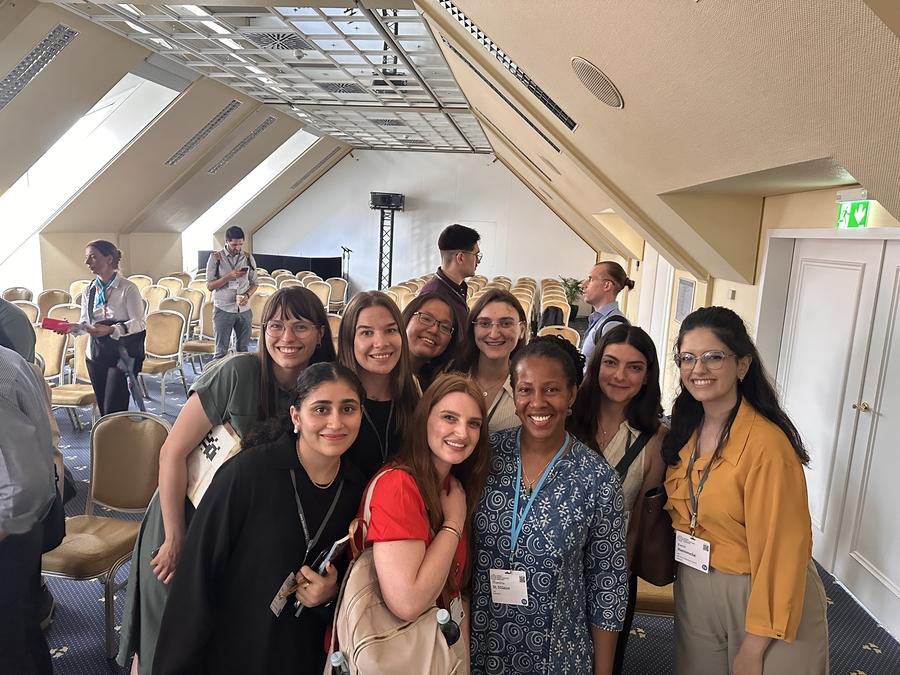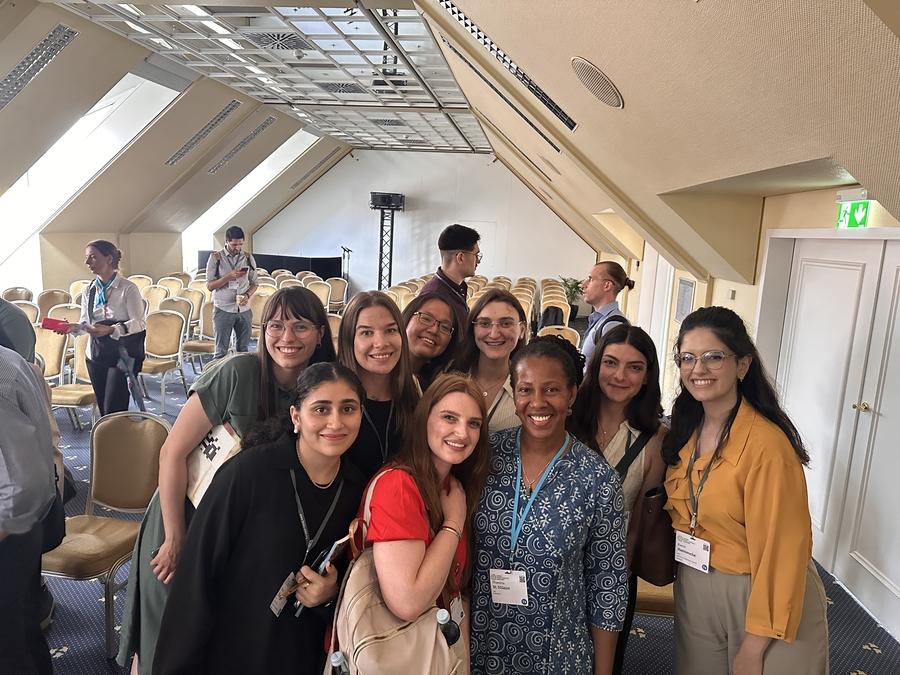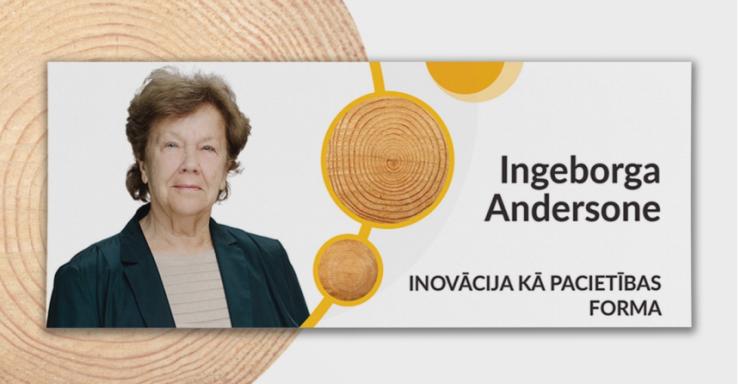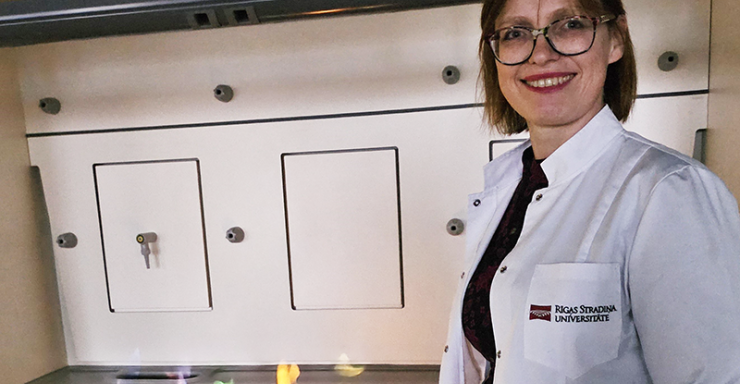From 29 June to 4 July 2025, the 74th Lindau Nobel Laureate Meeting, dedicated to chemistry, took place in Lindau, Germany. The event hosted 854 participants, including 606 early-career researchers representing 85 nationalities and 55 countries. Over the week, approximately 30 Nobel Laureates and special guests attended, creating a unique setting for interdisciplinary discussions, experience-sharing, and inspiring conversations. Latvia was represented by Laura Laimiņa at the meeting. (Source: Zinātnes Vēstnesis, Issue 7 (656), 28 July 2025).

Laura Laimiņa
This autumn, Laura will begin her second year of master’s studies at École Normale Supérieure de Lyon in France. Her journey in academia and research began at the University of Latvia (LU), where, since the first year of her bachelor’s program, she has been actively involved in the Ionic Liquids and Sustainable Chemistry laboratory. Laura specializes in designing ionic liquid structures, synthesizing them, and characterizing their physicochemical properties, investigating their potential for use in sodium‑ion battery membranes. Unlike traditional organic solvents, ionic liquids are virtually non‑volatile and non‑flammable, and their physicochemical traits could significantly enhance their suitability as safe, sustainable electrolytes with potential to improve ionic conductivity.
Laura has presented her research at three international conferences in the United Kingdom, France, and Latvia, won the best poster award twice, and was two years in a row honored as the “Golden Young Chemist” at the University of Latvia. Alongside her studies and research, Laura taught chemistry at Riga State Gymnasium No. 1 for three years. In 2023, she received the “Young Teacher of the Year” award from the Latvian Education Fund and Latvijas Avīze, after being nominated by the school’s 8th‑grade students.
“I enjoy working with primary school students, which is why I have created chemistry Olympiad tasks and helped students prepare for chemistry competitions. I am motivated by the opportunity to learn, collaborate, and bring that experience back to Latvia,” Laura affirms.
The Lindau Nobel Laureate Meeting
The Lindau Nobel Laureate Meeting is an international forum held since 1951 in Lindau, Bavaria, Germany. Laureates Nobel Prize winners and outstanding young scientists from around the world meet at the meeting. The event alternates among the three Nobel disciplines in the natural sciences: physiology and medicine, physics, and chemistry. Since 2000, an interdisciplinary meeting covering all three natural sciences occurs every five years. Since 2004, an economics Nobel Laureate meeting also takes place every three years.
Direct interaction with Nobel Prize laureates motivates young researchers and reminds them that behind the prestigious award is a human being shaped by years of work, mistakes, and perseverance. Israeli scientist and 2011 Nobel Prize in Chemistry Laureate Dan Shechtman said this year:
“Find one thing or niche and study it! Become the best in your field! Be experts and know your direction perfectly.”
How to Become a Participant in the Lindau Meeting
Laura first learned about this event in 2024, when researcher Rihards Ruska from the LU Institute of Solid State Physics represented Latvia at the Lindau meeting dedicated to physics. The Lindau Nobel Laureate Meeting is held in summer, and applications open in the previous autumn. In October 2024, the Latvian Association of Young Scientists (LJZA), in collaboration with the University of Latvia, informed Laura about the opportunity to apply and organized the first selection round.
There are two pathways to participate: one is nomination by a scientific institution that is an academic partner of the Lindau Meetings; the other is applying through the open competition. In both cases, the final decision is made by the Lindau Meeting’s Scientific Council. Needless to say, competition is fierce.
Laura received confirmation of her participation in March 2025, while she was doing an internship at the Laboratoire de Chimie de l’ENS de Lyon in France, under the supervision of Res. Prof. Margarida Costa Gomes (CNRS) and Dr. Frederik Philippi (a Marie Sklodowska‑Curie postdoctoral fellow), who both provided letters of recommendation for her participation.
Laura says:
“I was happy to receive the confirmation, because unless you become a Nobel Prize laureate yourself, this opportunity in a career is unique. I am grateful to the University of Latvia as well. Latvia offers a wonderful environment for young researchers—students have the opportunity to work on scientific projects from the very first years. That is not typical abroad. At the Lindau meeting, I was one of the younger participants, but my prior research experience gave me the confidence to participate actively.”
Programme Highlights
The meeting programme was intense. For six days, from early morning until late evening, there were scientific and inspiring conversations and lectures. Each day began with three Nobel Prize laureate lectures, in which they discussed both recent research outcomes and their own paths toward significant discoveries. Following those were Agora talks, in which laureates discussed significant and sometimes controversial topics. Listeners could take part in the ensuing discussions.
More personal were the Open Exchange sessions, where young scientists met individually with one Nobel Prize laureate. These sessions had an informal atmosphere, allowing questions not only about career and science but also about motivation, family, free time, or views on the political situation in the world. Several young scientists had the opportunity to participate in Next Gen Science sessions, where they presented their research. These presentations offered the chance to showcase their work and receive questions and comments from the audience, including Nobel Prize laureates. Participants could vote in advance on which colleagues’ work they wanted to hear.
This year’s programme also included several sessions on topics currently relevant in chemistry, such as artificial intelligence in chemistry, notable achievements in chemistry, sustainable chemistry and sustainability in chemistry, and the latest opportunities and advancements in chemical research.
There were various panel discussions. In the panel “Artificial Intelligence in Chemistry: How Is AI Changing the Game?”, participants discussed the impact of AI technologies—such as machine learning and data analysis—on the development of the chemistry field, including drug discovery, materials research, and experiment planning. AI was characterized as a tool that helps chemists become more efficient and precise, while still considering ethics, reliability, and the human’s role in collaboration with AI technologies.
In the panel “From Linear to Circular: Chemistry’s Path to Sustainability,” attendees focused on chemistry’s contribution to achieving sustainable development goals. Discussions covered green chemistry approaches, circular thinking, and changing daily laboratory habits. Participants spoke not only about responsible environmental action but also about how scientists can influence change in education, policy, and industry.
Meanwhile, in the panel “Global Challenges, Global Solutions: The Role of Science Diplomacy,” the importance of science in international cooperation was analyzed, recognizing that scientific collaboration fosters trust between countries and provides solutions to shared global issues. The discussion addressed the importance of science in areas like climate change, public health, and technological development and explored how scientists can engage in science diplomacy and international policymaking.
The programme also included sessions that required prior registration or individual invitation. Examples included morning discussions in collaboration with various organizations aimed at encouraging meaningful conversations among participants in a relaxed atmosphere. A special offering included guided walks around Lindau or lunches with a Nobel Laureate. Each group for such lunch was limited to no more than ten early-career scientists.
Laura, as part of a 30-person group, had the opportunity to participate in one of three workshops titled “Science Without Borders,” which covered international cooperation opportunities, research mobility, and the political situation’s impact on the career of young scientists in the US. The discussions were open and thought-provoking, especially because participants represented different countries and experiences.
Memorable Moments
Laura greatly appreciated the opportunity to talk with several Nobel Prize laureates.
One of the standout moments was her conversation with Steven Chu, Nobel Laureate in Physics 1997, about politics, the importance of science in society, and his experience working as a scientific advisor in the administration of US President Barack Obama (2009–2017). A very heartfelt encounter was with 2022 Nobel Laureate in Chemistry Morten Peter Meldal and his spouse, scientist Phaedria Marie St. Hilaire. They shared experiences about balancing research and family life and mutual everyday support. Laura emphasizes:
“At times it seemed the spotlight of the conversation wasn’t on him but on his wife—with her calm, thoughtful perspective and presence. It was truly inspiring!”
Another emotionally charged conversation was with 2011 Chemistry Nobel Laureate Dan Shechtman. He spoke about how he maintained confidence in his work for years despite being doubted by many. He remarked:
“The chance to be born is nearly zero, so appreciate your life.” His hobbies include making jewelry and sailing. Shechtman highlighted that many laureates receive their award at a life stage where lab work is no longer daily. At that point, many shift toward passing on knowledge, inspiring the next generation, and educating society.
Laura eagerly anticipated meeting Benjamin List, who shared the 2021 Chemistry Nobel Prize with David W. C. MacMillan. Unfortunately, Benjamin List unexpectedly canceled his participation in the event, but Laura still had the chance to meet David W. C. MacMillan. In Latvia, she and her colleagues had prepared cards with molecular structures for both laureates to sign, intending to later affix them to sample vials—and she managed to get one signature!
Laura also met Professor Valeria Nicolosi, who is a member of the Lindau Nobel Laureate Meeting’s Scientific Council and one of the main organizers of the chemistry programme. Nicolosi’s scientific journey began in Sicily, where she studied chemistry at the University of Catania. Later she moved to Dublin, pursued a PhD, and met a supervisor who truly supported her career. She spent time in Oxford but returned to Dublin for personal reasons. Nicolosi now heads a nanomaterials and microscopy research group at Trinity College Dublin, holding the first full professorship awarded at that faculty since the university was founded in 1592. Alongside her academic work, she advises the Irish government on science policy. Valeria Nicolosi’s journey inspires and shows how one can build an international career without losing one’s values. The scientist emphasized that being a woman did not create barriers, but often it was difficult to gain recognition. Many colleagues didn’t take her seriously at first, believing that she wasn’t experienced enough for senior academic roles. Meeting other young scientists from around the world was also special.
Laura reflects:
“I had never before in a single week spoken to so many different people. I truly enjoyed the sense of togetherness, friendship, exchange of ideas, and the energy that arises when over six hundred passionate minds convene in one place.”
Key Insights
First, scientists are an essential part of society. At this meeting, several speakers stressed how fragile science becomes where political changes threaten academic freedom. Science needs an environment in which it can develop independently, not jeopardized by restrictions on funding, mobility, and academic freedom.
For example, scientists traveling to conferences in the US are advised to bring phones and laptops with no data to avoid issues at border crossings. Several US-based early-career researchers received warnings before attending this event that returning to the US could pose problems, and they subsequently withdrew.
Second, to address sustainability and climate change challenges, societal awareness is essential—not just within the scientific community. These topics must be rooted in everyone’s consciousness from school age. The meeting emphasized that STEM education, critical thinking, and environmental awareness must begin in early schooling.
Third, working in fundamental science may not immediately yield practical applications, but it lays the groundwork for future discoveries. As Laura observed,
“I realize that fundamental science is an important foundation for future breakthroughs. I may not create a new technology myself, but my work will help someone else to build upon these results and move forward.” That is the path of scientific progress—step by step, through collaboration and building on past work.
Modern research increasingly uses smaller quantities of substances thanks to high‑precision methods such as various spectroscopies, which enable analysis of minuscule samples. This allows every researcher to think responsibly about using resources. It not only minimizes environmental impact but also enhances work quality. Solvents and other chemical waste are no longer simply poured down the sink, as was sometimes done in the past. Many laboratories already are—or are striving to become—green and sustainable.
Another important insight relates to transparency in science. Publishing negative or unsuccessful results would be valuable to other researchers. This practice helps others understand which approaches did not deliver expected outcomes, thereby saving resources and avoiding repetition of unsuccessful methods. Unfortunately, publishing such information is not easy—it takes time, and often there is no funding or platforms for it. Nevertheless, in the long term it would benefit the entire scientific community and society.
In conclusion, Laura says,
“I strongly encourage anyone interested in science to apply for this event. This meeting offers a unique opportunity to meet like‑minded individuals, find inspiration, and see a broader role for science in the world. I am truly grateful and happy to have had the chance to participate. At first, I thought it would be hard to get involved or express my views among so many young scientists and Nobel Laureates. But I was present every moment and overcame my fears. Not everyone will become a Nobel Prize laureate, but anyone can be passionate and responsible on the path of science. Science is teamwork, and one must be able to celebrate not only one’s own achievements but also the accomplishments of others—because behind even the most outstanding individual there is always an entire team and sources of inspiration.”


